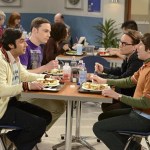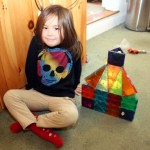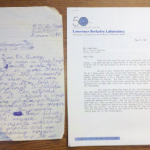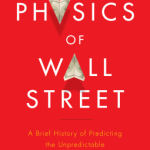
I found myself writing about the social skills of scientists today for the book-in-progress (something I've done here before), and how they're portrayed in the media, so of course I had to drop in a reference to "The Big Bang Theory." Jim Parsons's portrayal of Sheldon Cooper pretty much nails down one of the extremes of the "socially inept scientist" axis, the borderline autistic genius who can't comprehend normal social interactions, but still won't shut up. The other extreme, of course, is occupied by Paul Dirac, who famously almost never spoke.
"The Big Bang Theory" is an endless source…
Last Friday, when I didn't have any time to blog, Zen Faulkes wrote an interesting wrap-up post on Science Online 2013 in which he declared he won't be back. Not because it was a bad time, but because other people would benefit from it more, and his not going frees up a spot for somebody else.
I recognize a lot of his reaction, though there were a couple of things that I got out of it that I think made it worthwhile, beyond just the socialization. On the whole, though, it wasn't really a transformative experience for me. I like to think, though, that I was able to provide a few things that…
[Scene: Dinner at Chateau SteelyPips. DADDY is starting to say something about his day at work, when STEELYKID interrupts.]
STEELYKID: If you eat too many hot dogs, you'll turn into a hot dog!
DADDY: That would be pretty silly. Luckily, you're eating chicken for dinner. Eat your chicken.
STEELYKID: There's a magic hot dog, and if you eat that, you turn into a hot dog. And if you don't eat it, then you won't turn into a hot dog.
MOMMY: That's good, because you wouldn't want people turning into hot dogs for no reason.
STEELYKID: Yeah, that would be silly.
DADDY: So, where is this magic hot dog…
I ran across this recently while looking for something else, and was reminded of it by this discussion of jargon. It's an attempt to explain the general historical context of the whole Higgs Boson thing, and why it's important. I improvised this in response to somebody's question about how I would explain that, drawing mostly on my recollection of a couple of history-of-field-theory books. I kept it in case I needed to bust it out when they discovered the Higgs, but that fell during the time when I wasn't able to blog, so I never used it. I'm never going to use it for anything else, though,…
This is the third post in which I'm pulling a revise-and-extend job on some things I said at Science Online at a few panels on bloggy stuff, and the one I'm least settled about. Previous posts covered the in how-to-do-outreach session (posted Monday and the blogging long term session (posted yesterday). This one covers the what-to-do-when-people-start-taking-you-seriously session.
I say that this is the one I'm least settled about because what I said in that panel had literally not occurred to me before listening to that discussion. I've been thinking about it off and on since, and am still…
This is the second post in which I'm pulling a revise-and-extend job on some things I said at Science Online at a few panels on bloggy stuff: in the how-to-do-outreach session (posted yesterday, the blogging long term session, and the what-to-do-when-people-start-taking-you-seriously session. In order to get these out in a timely manner, while catching up on all the work I have to do, I'm splitting these up into individual posts, though really they all kind of fit together.
Blogging for the Long Haul
There were two easily misinterpretable things that I said at this one, that deserve a bit of…
I ended up feeling that my most valuable contribution to the Science Online meeting (other than boosting the income of the Marriott's bartenders) was providing experienced commentary and advice from a slightly different angle than a lot of the other participants. A bunch of this got tweeted out by other people in the sessions, but the format (both at the conference and on Twitter) necessarily strips a lot of nuance out of what I was trying to say (and not always saying successfully). so I thought I'd revise and expand on my remarks a little bit. In particular, I want to post expanded versions…
The Sciece Online meeting wrapped up yesterday afternoon, though the associated conversations and socialization carried on late into the night. I got to meet a lot of people I've only previously known as cartoon avatars, and spent a surprising amount of time talking about rugby.
One of the things that stands out about the meeting, and that lots of people raved about, is the "unconference" style, where there aren't formal presentations, but moderated discussions. This wasn't all that surprising to me, because it's essentially identical to the more casual sort of panel at a science fiction…
I thought I had mentioned it on Twitter enough, but as several people were surprised to see me last night, it's probably worth saying more prominently: I'm at the Science Online 2013 conference in Raleigh, NC this week. This is making me tremendously popular with my class, who are taking an exam tonight...
Anyway, if you weren't aware that I was going to be here, now you know. If last night and this morning are any indication, I may not have any voice left by the end of the conference-- the bar was LOUD last night-- but if you're around, say hi.
It's been a good while since I did any Cute Kid Blogging, due to excessive busy-ness. There's big news among the younger residents of Chateau Steelypips, though: SteelyKid lost one of her front teeth the other day:
SteelyKid showing off her missing tooth
That gap? Wasn't there on Friday morning. Lest you think we're horrible people who let her run headfirst into a pole or something, while we were surprised to have one come loose this early, she's within the normal age range for losing baby teeth. Just barely, but then she got teeth really early, too-- she had eight at eight months old. So I…
While in the library looking for something else, I noticed a book called The Trouble with Science by Robin Dunbar, whose description made it sound very much on point for my current project:
In The Trouble with Science, Robin Dunbar asks whether science really is unique to Western culture, even to humankind. He suggests that our "trouble with science"--our inability to grasp how it works, our suspiciousness of its successes--may lie in the fact that evolution has left our minds better able to cope with day-to-day social interaction than with the complexities of the external world.
Somewhat…
I have mentioned before that when I was a kid, I wrote a letter to Luis Alvarez, the 1968 Nobel laureate in Physics, asking some questions about his theory that an asteroid impact killed the dinosaurs, which had been featured in a NOVA special. I got a very nice letter back from him, very graciously correcting the dumber questions I asked. This made a very favorable impression, which in turn played a role in getting me to include him in the work-in-progress.
Since I was thinking about Alvarez for the book, I asked my parents if they still had a copy of the letter, which for many years I had…
As research for the work-in-progress, I recently read Luis Alvarez's autobiography, Alvarez: Adventures of a Physicist, which contains a passage that I was reminded of last night while reading another book, that seems like an amusing follow-up to yesterday's rant about theory and experiment. This is from the end of the chapter where he joined Ernest Lawrence's Radiation Lab at Berkeley, and found he needed to get up to speed on a lot of physics he'd missed learning at the University of Chicago:
The other important component to my self-help program was a detailed study of three articles that…
There's been a bunch of talk recently about a poll on quantum interpretations that showed physicists badly divided between the various interpretations-- Copenhagen, Many-Worlds, etc.-- a result which isn't actually very surprising. Sean Carroll declares that the summary plot is "The Most Embarrassing Graph in Modern Physics, which I think is a bit of an overreaction, but not too much of one. I do strongly disagree with one thing he says in explaining this, though:
Not that we should be spending as much money trying to pinpoint a correct understanding of quantum mechanics as we do looking for…
Last week's post talked about the general idea of negative temperature, with reference to this much-talked-about Science paper (which also comes in a free arxiv version from which the figures used here are taken). I didn't go into the details of how they made a negative temperature gas, though, and as it's both very clever and hard to follow, I figure that deserves a post of its own.
Right, so last time you said that negative temperature just means you're more likely to find fast-moving atoms than slow ones, so all they need to do is whack these atoms in the right way? Right? No, it's more…
The most talked-about physics paper last week was probably Negative Absolute Temperature for Motional Degrees of Freedom (that link goes to the paywalled journal; there's also a free arxiv preprint from which the above figure is taken). It's a catchy but easily misinterpreted title-- Negative absolute temperature! Below Absolute Zero! Thermodynamics is wrong!-- that obscures the more subtle points of what's going on here. So, in the interest of clarity, I'm going to attempt an explanation, over the course of a few posts, but given my schedule these days, that might spread over a couple of…
Kate and I went down to New York City (sans kids, as my parents were good enough to take SteelyKid and The Pip for the weekend) this weekend, because Kate had a case to argue this morning, and I needed a getaway before the start of classes today. We hit the Rubin Museum of Art, which is just about the right size for the few hours we had, got some excellent Caribbean food at Negril Village, then saw The Old Man and the Old Moon in a church basement at NYU (the show was charming, the space was stiflingly hot by the end). All in all, a good weekend.
I drove back Sunday afternoon, and was…
I started following Chris Stedman on Twitter thanks to a recommendation from Josh Rosenau citing him as someone who promotes atheism without being contemptous of religious people. He was, indeed, a source of religion-and-politics material that I found congenial, and when I noticed he was flogging a forthcoming book, I picked up a copy, which I just got around to reading.
I'm a little hesitant to review this at all here on ScienceBlogs, given past history. I've pretty much completely withdrawn from culture-war blogging, finding it more aggravating than useful, and these days just about the…
As I hinted obliquely a little while back, I don't have a terribly high opinion of Wall Street or Wall Street traders. Given that, I'm not the most obvious audience for a book titled The Physics of Wall Street, and truth be told, I wouldn't've picked it up on my own. The publisher sent me an advance copy back in August, though, and I had a plane trip coming up to go play golf with some guys who work in business, so I thought it might make a decent read and possible conversation topic, and took it along.
I was very pleasantly surprised to find that it contains much more physics than Wall…
The Pip's ringing in the New Year... Well, OK, he's actually asleep upstairs. Because when you have a one-year-old and a four-year-old, you don't really get out to a lot of parties on New Year's Eve.
Anyway, to be honest, I won't be all that sorry to see 2012's taillights fade to black. There were undoubtedly some good things-- the publishing of How to Teach Relativity to Your Dog and a few smaller things, and the sale of How to Think Like a Scientist, along with some other weird-but-fun stuff that's not tangible enough to talk about yet. There were also some very bad things-- several deaths…







